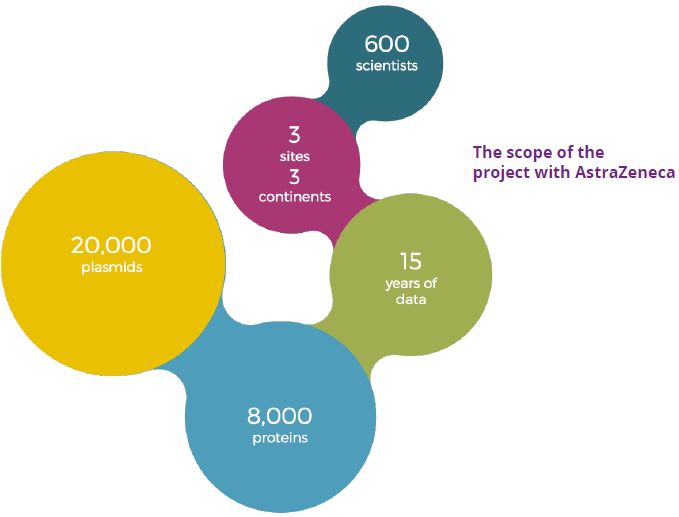Case study
Labguru centralizes AstraZeneca's systems and data to generate insights faster
About
People
David Nicholls Enabling Capabilities Manager of the Discovery Sciences Unit
Overall Goal
Deploying a future-proofed application service to better manage inventories of biological reagents across multiple global research sites.
Approach
Investing in a centralized and flexible data management solution from Labguru.
Results
- Labguru allows the Discovery Sciences Unit to unify information and render it available to AstraZeneca researchers around the world
- AstraZeneca scientists were able to start using Labguru immediately
- Due to inherent features of Labguru, the AstraZeneca team was empowered to simplify its workflow quickly and easily

David Nicholls
Enabling Capabilities Manager of the Discovery Sciences Unit
Summary
About
People
David Nicholls Enabling Capabilities Manager of the Discovery Sciences Unit
Overall Goal
Deploying a future-proofed application service to better manage inventories of biological reagents across multiple global research sites.
Approach
Investing in a centralized and flexible data management solution from Labguru.
Results
- Labguru allows the Discovery Sciences Unit to unify information and render it available to AstraZeneca researchers around the world
- AstraZeneca scientists were able to start using Labguru immediately
- Due to inherent features of Labguru, the AstraZeneca team was empowered to simplify its workflow quickly and easily

David Nicholls
Enabling Capabilities Manager of the Discovery Sciences Unit

The Discovery Sciences Unit in the Innovative Medicines Unit of AstraZeneca collaborates with global therapeutic research groups known as iMEDs and applies core competencies to deliver a portfolio of drug discovery projects from initiation through candidate selection. Discovery Sciences is engaged in all stages of the process, enabling hit identification as well as lead generation and optimization to support target quality with tools and reagents.
We interviewed David Nicholls, Enabling Capabilities Manager of the Discovery Sciences Unit at AstraZeneca.
Implementation
Prior to using Labguru, the Discovery Sciences Unit depended on two legacy systems to document and manage biological stocks – plasmids, cell lines, viruses, and protein batches – and associated workflows. One system had been in place for 15 years and was reaching the end of its development life cycle. The second system was primarily developed and supported by single employee.
While implementing the Labguru bio-collection management system, David and his team completed an IT project that supplies the Discovery Sciences Unit with an organizational management and logistics tool.
David believes that with the implementation of Labguru, his team has chosen an agile path, and a system that provides the flexibility necessary for future changes. Labguru aggregates all bio-reagent information so it can be accessed globally across iMEDs. “We want to unify our information so that it is available anywhere," he explains. "The information was previously in disconnected systems where local researchers used that information in different ways. We were missing opportunities to share information, and consequently, one research group would not know if another group possessed a certain bioasset. Going forward, Labguru will help us avoid duplication and better manage inventory globally. New opportunities will open up as users get proactive insights from the system.”

Integration
David first integrated a system of reagents used in X-ray crystallography. Information from Labguru regarding the concentration of reagents, protein sequences, and the buffer components was available to facilitate the design of crystallography experiments, and David was very impressed by the support he received and how quickly implementation was achieved. "It was the fastest IT implementation I have ever been personally involved in,” he said, "and 15 years worth of data had to be migrated from the legacy system into Labguru. It was absolutely fantastic!"
The AstraZeneca team suggested a significant number of changes and improvements to the Labguru system, and was blown away by how responsive the Labguru team was and how quickly changes were made. "We have a really good dialogue with the Labguru development team", explains David. "We worked together to move forward quickly, without the bureaucracy often associated with IT development.”
Scientific support
David reports that the Labguru team were also quick to pick up on the scientific reasons behind requests during implementation. “We had to explain to the Labguru team why the tool had to be modified in certain ways. They were quick to grasp the concepts thanks to their experience in implementing the tool at other academic and pharmaceutical sites,” he gushes," and this empowered them to simplify our processes so that our scientists could focus more of their energy on the science of developing new medicine.”
Once the Discovery Sciences Unit implemented the Labguru Bio-collection Management system, team members were thrilled with their user experience. As David explains, “We can figure out Labguru with minimal training. The tool offers one inventory list and the researchers simply select the bio-collection of interest. It’s very nicely laid out.”
Labguru offers the fastest IT implementation I have ever been personally involved in!
ROI from Labguru
The Discovery Sciences Unit has already seen a return on its investment. “In the previous system we had a data sheet that was provided to customers when an individual protein or a box of proteins was delivered," explained David. "This data sheet would describe what the protein was, its concentration, amount, and buffer. There were previously several ways to make these data sheets available, which involved additional work. With Labguru in place, the data sheet is created automatically and printed using the data which has already been entered into the tool. We have successfully simplified this process and removed unnecessary work.”
David and his team are currently building a business case to expand the use of Labguru to help the Discovery Sciences Unit manage its collaborations with academic groups, biotech companies, and CRO partners more effectively. The reason is simple, says David, "Thanks to Labguru's potential, we at AstraZeneca can partner more effectively with any group, anywhere in the world.”